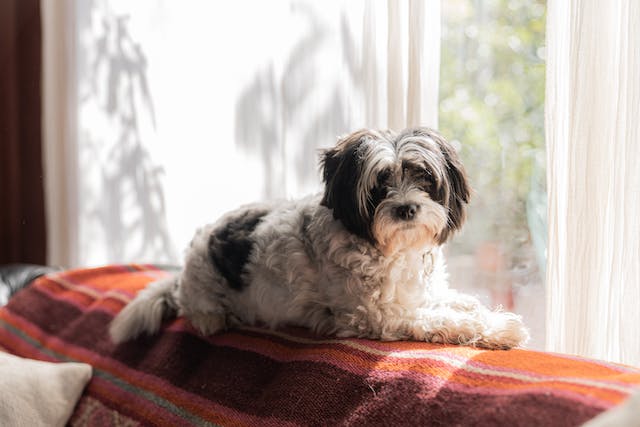If you have a lovable Shih Tzu at home, you may have noticed some signs of separation anxiety when you leave them alone.
In this blog post, we’ll explore the common symptoms of separation anxiety in Shih Tzus and provide some tips to help ease their distress.
So, let’s dive in and learn how to make your furry friend feel more secure when you’re not around!
What is Shih Tzu Separation Anxiety?
Shih Tzu separation anxiety refers to a condition where Shih Tzu dogs experience distress and anxiety when they are separated from their owners or left alone.
This can manifest in behaviors such as excessive barking, destructive chewing, urinating or defecating indoors, and attempting to escape.
Separation anxiety in Shih Tzus can be caused by factors such as lack of socialization, changes in routine, or previous traumatic experiences.
It is important for owners to address separation anxiety in Shih Tzus through proper training, gradual desensitization, and providing them with mental and physical stimulation to alleviate their anxiety.
Shih Tzu Separation Anxiety Symptoms
The following are some of the most common Shih Tzu separation anxiety symptoms you should know:
1. Destructive behavior: Dogs with separation anxiety may engage in destructive behavior as a way to cope with their anxiety and the stress of being left alone. Shih Tzus may chew on furniture, shoes, or other household items, particularly near exits, doors, or windows. This behavior can be an attempt to escape or alleviate their anxiety. It’s important to note that destructive behavior may also be a result of boredom or lack of mental and physical stimulation, so it’s essential to rule out other causes as well.
2. Excessive vocalization: Shih Tzus with separation anxiety may exhibit excessive vocalization as a means of expressing their distress. This can include howling, barking, or whining, particularly when left alone. The vocalization may continue for an extended period of time and can be disruptive to both the dog and the surrounding environment. The dog may try to vocalize in order to communicate their anxiety and attract attention in the hope of being reunited with their owner.
3. Toileting accidents: Dogs with separation anxiety may have accidents indoors, even if they are usually fully house-trained. This can include urinating or defecating in inappropriate areas of the house. The accidents may occur shortly after the owner leaves or during the entire duration of their absence. These accidents are not a result of laziness or disobedience but rather a manifestation of the dog’s anxiety. The stress and anxiety experienced by the dog can lead to a loss of control over their bladder and bowels.
4. Excessive excitement upon your return: Shih Tzus with separation anxiety often display excessive excitement when their owners return home. They may jump, bark, or exhibit hyperactive behavior, which can be mistaken for joy or happiness. However, this behavior is actually a result of the dog’s relief and reassurance that their owner has returned, helping to alleviate their anxiety. The dog may exhibit this excitement as a way to communicate their emotional state and seek attention and reassurance.
5. Signs of anxiety before you leave: Dogs with separation anxiety may exhibit signs of anxiety before their owners leave the house. These signs can include pacing back and forth, panting, trembling, or restlessness. The dog may become clingy and follow their owner around, trying to prevent them from leaving. These behaviors are indications that the dog is already anticipating being left alone and is experiencing anxiety in response to the impending separation. The dog may display behaviors that signal their distress and attempt to communicate their desire for the owner to stay.
6. Trembling: Trembling is another possible symptom of separation anxiety in Shih Tzus. The dog may tremble when left alone or when anticipating being left alone. This trembling can be a physical manifestation of the dog’s anxiety and can range from mild to more pronounced shaking. The trembling can be a result of increased adrenaline and nervousness, and it may persist until the dog is reunited with their owner or the anxiety subsides.
7. Panting: Panting is a common sign of anxiety in dogs, including those with separation anxiety. It may occur when the dog is left alone or when experiencing distress. Panting is a way for the dog to regulate their body temperature, but it can also be a sign of increased stress and anxiety. The dog may pant excessively as a response to their heightened emotional state, and it can be accompanied by other signs of anxiety such as pacing, drooling, or dilated pupils.
Causes of Shih Tzu Separation Anxiety

Shih Tzu separation anxiety can be caused by a variety of factors. Firstly, these dogs are known for their strong attachment to their owners, making them more prone to anxiety when left alone.
Secondly, changes in routine or environment, such as moving to a new house or the loss of a family member, can trigger separation anxiety in Shih Tzus.
Thirdly, lack of socialization and exposure to new experiences during their early development stages can contribute to separation anxiety.
Additionally, if a Shih Tzu has experienced a traumatic event or has been consistently exposed to negative experiences when left alone, it can intensify their separation anxiety.
Lastly, certain genetic predispositions may make some Shih Tzus more susceptible to separation anxiety.
Overall, understanding these common causes can help owners address and manage separation anxiety in Shih Tzus effectively.
Effects of separation anxiety on Shih Tzu

Separation anxiety in Shih Tzu can have various effects on their behavior and well-being. Firstly, they may exhibit signs of distress when left alone, such as excessive barking, whining, or destructive behavior.
Secondly, they may become overly attached to their owners and display clingy behavior.
Thirdly, separation anxiety can lead to physical symptoms like loss of appetite or digestive issues. Fourthly, it can hinder their ability to socialize and interact with other dogs or people.
Lastly, addressing separation anxiety through training and providing mental stimulation can help alleviate these effects and improve the dog’s overall quality of life.
Read more about socializing your Shih Tzu.
Effective Ways of Addressing Shih Tzu Separation Anxiety

Separation anxiety can be a common issue for Shih Tzus, as they are companion dogs that thrive on human companionship.
Here are some effective ways to address Shih Tzu separation anxiety:
1. Proper Training: Adequate training is crucial for Shih Tzus to understand and follow commands. It helps establish boundaries and expectations, creating a sense of security for them. Basic obedience training can teach your Shih Tzu to stay calm and relaxed even when you’re not around. Positive reinforcement techniques, such as rewarding good behavior with treats or praise, can be especially effective in training Shih Tzus.
2. Gradual Departures and Arrivals: Gradual departures and arrivals help your Shih Tzu become accustomed to your comings and goings without experiencing extreme anxiety. Start by leaving for short periods, such as a few minutes, and gradually increase the duration over time. When you return, avoid making a big fuss or giving excessive attention, as this can reinforce their anxiety.
2. Provide a Safe Space: Creating a safe space for your Shih Tzu when you’re not home gives them a sense of security. This can be a crate or a small, enclosed area of the house. Make sure the space contains their bedding, toys, and familiar scents. The confined space can provide them with a den-like environment, which can help them feel more secure.
3. Counterconditioning: Counterconditioning involves changing your Shih Tzu’s emotional response to your departure cues by associating them with positive experiences. For example, before you leave, give your dog a special treat or a puzzle toy filled with treats that will keep them engaged and occupied. This creates a positive association with your departure and helps distract them from feeling anxious.
4. Desensitization: Desensitization involves gradually exposing your Shih Tzu to the triggers of their anxiety, such as picking up keys or putting on a coat, without actually leaving. This helps them become desensitized to these cues and reduces their anxiety. Start by performing these actions without leaving, and gradually increase the intensity of the cues over time.
5. Calming Techniques: Calming techniques can help soothe your Shih Tzu’s anxiety when you’re not home. Playing soothing music or leaving a TV or radio on can provide a comforting background noise that can help mask outside sounds and create a sense of companionship. Pheromone diffusers or sprays, such as Adaptil, release synthetic dog appeasing pheromones that can help reduce anxiety in dogs.
6. Leave Familiar Smells: Shih Tzus are highly sensitive to scent, and leaving an item with your scent can help soothe their anxiety. Place a used t-shirt or blanket with your scent in your dog’s safe space or crate. Your familiar scent can provide a sense of reassurance and make them feel closer to you, reducing their separation anxiety.
7. Exercise and Mental Stimulation: Regular exercise and mental stimulation are crucial for Shih Tzus, as they help burn off excess energy and keep them mentally engaged. Before leaving, engage in activities such as walks, playtime, and puzzle toys to tire them out physically and mentally. A tired and mentally stimulated dog is more likely to be calm and relaxed when left alone.
8. Avoid Punishment: Punishing your Shih Tzu for their anxious behavior can exacerbate their anxiety and make the problem worse. Instead, focus on positive reinforcement by rewarding calm behavior. When your Shih Tzu remains calm during periods of separation, provide them with treats, praise, or a special toy to reinforce the desired behavior. This positive association helps them understand that being alone can be a positive experience.
9. Professional Help: If your Shih Tzu’s separation anxiety is severe or persists despite your efforts, seeking help from a professional dog trainer or a veterinary behaviorist is recommended. They can assess your dog’s behavior, provide specialized guidance, and develop a tailored treatment plan. They may suggest additional techniques or even recommend medication in severe cases.
Remember, addressing separation anxiety requires patience, consistency, and observation. Each dog is unique, and it may take time to find the most effective strategies for your Shih Tzu.
It’s important to tailor your approach to your dog’s specific needs and seek professional help if necessary.
Frequently Asked Questions
How can I tell if my Shih Tzu is experiencing separation anxiety?
Look out for signs such as excessive barking, destructive behavior, urinating or defecating indoors, and restlessness when you’re not around. These are common symptoms of separation anxiety in Shih Tzus.
Is separation anxiety common in Shih Tzus?
Yes, Shih Tzus are known to be prone to separation anxiety. They are social dogs and thrive on human companionship, so being left alone for long periods can induce anxiety in them.
What can I do to help my Shih Tzu with separation anxiety?
Gradual desensitization and counterconditioning can be effective techniques. Start by leaving your Shih Tzu alone for short periods and gradually increase the duration. Provide them with engaging toys or puzzles to keep them occupied while you’re away.
Are there any medications that can help treat separation anxiety in Shih Tzus?
In severe cases, your veterinarian may prescribe anti-anxiety medications to help manage your Shih Tzu’s separation anxiety. However, medication should always be used in conjunction with behavioral training and under professional guidance.
Can separation anxiety in Shih Tzus be prevented?
While some Shih Tzus may be more prone to separation anxiety than others, early socialization and gradually acclimating them to being alone can help prevent or minimize separation anxiety. Building their confidence and independence from a young age can make a difference.
Should I consider getting another dog to help alleviate my Shih Tzu’s separation anxiety?
While getting another dog may provide companionship for your Shih Tzu, it’s not a guaranteed solution for separation anxiety. It’s essential to address the underlying anxiety through training and behavior modification techniques before considering adding another pet to the mix.
Read more about health problems in Shih Tzu.
Conclusion
In conclusion, it’s essential to recognize the signs of separation anxiety in your Shih Tzu. Remember, they rely on us for comfort and security, so it’s crucial to provide them with a safe and loving environment. By understanding their symptoms and taking steps to alleviate their anxiety, we can ensure our furry friends lead happy and balanced lives.

